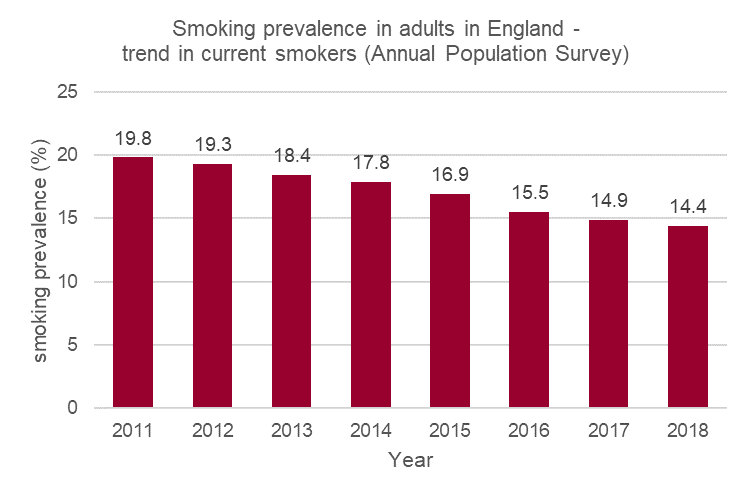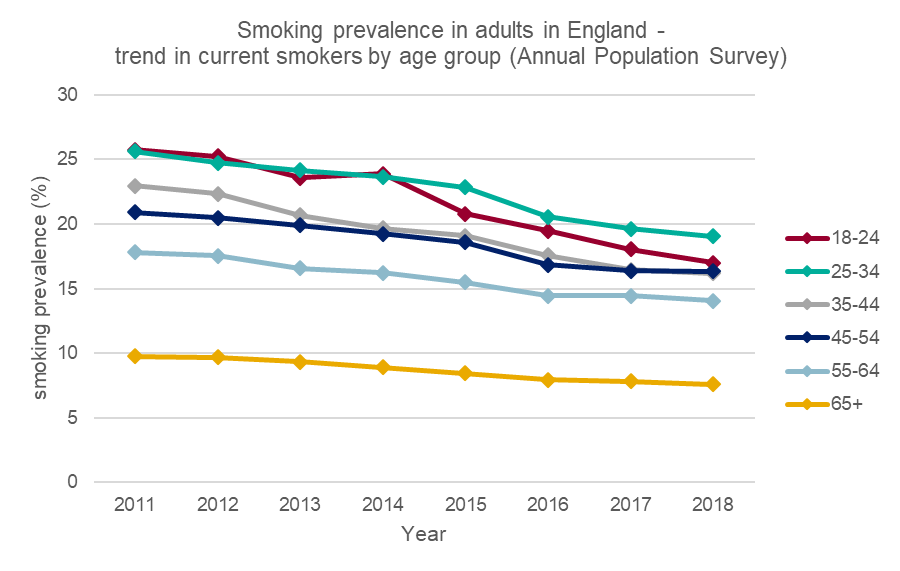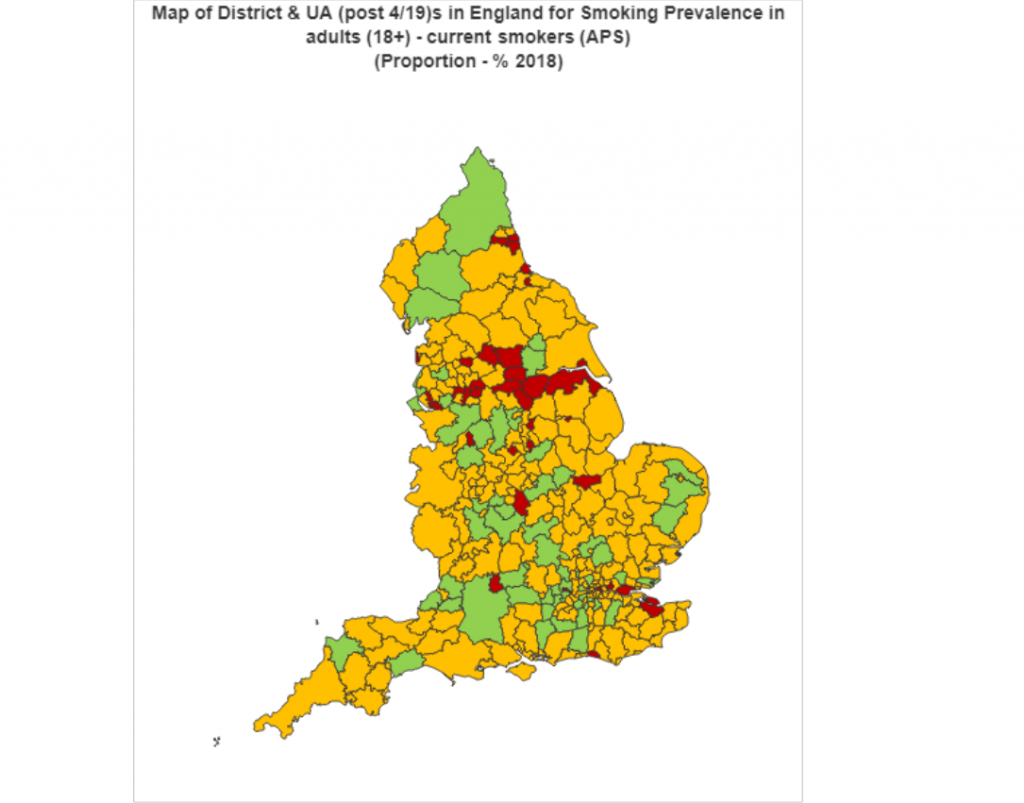
Updated 2 July, 2019
New official statistics show the positive news that smoking prevalence in England is continuing to fall. 14.4% of adults in England smoke, down from 14.9% the previous year – a drop of almost 175,000. There are almost two million fewer smokers now than in 2011.
While smoking is in terminal decline, it remains the nation’s biggest killer and today, we are one step closer to a smokefree generation – but there is still much work to do.
Adult Smoking Habits in the UK: 2018 published by PHE and ONS shows that smoking prevalence in England has fallen to 14.4%. This means rates are down by almost a quarter from 19.3% five years ago – bringing the estimated number of smokers in England to around 6 million.

Who’s still smoking?
Despite efforts to reduce inequalities, there are still groups where smoking rates remain stubbornly high. Smoking among 18 to 24 year olds has fallen fastest but of particular concern is the 1.4 million 25-34 year olds who smoke – that’s equivalent to one in five.

We are also seeing an ever-widening gap between people in routine and manual occupations and those in managerial and professional posts:
- 1 in 4 people in routine and manual occupations is a smoker compared to 1 in 10 in managerial and professional posts
- The odds of smoking in the routine and manual group is more than twice that of other employed groups
- People who are unemployed are almost twice as likely to smoke as those in work
In addition, those who have no qualifications are four times as likely to smoke as those who have a degree but ethnically, the picture is complex. Smoking rates for men vary from 14.3% in Chinese and 14.8% in Asian populations to 23.1% in mixed ethnicity groups. For women, it varies from 3% in Chinese and 3.3% in Asian groups to 18% in mixed ethnicity groups. Smoking rates also vary significantly according to country of birth, with the highest among those born in Poland (24.8%), compared with 5.2% born in India and 14.6% born in England.
The large sample in the Annual Population Survey (APS) also allows fairly confident estimates of local smoking rates. Kingston upon Hull (26.1%), Barking and Dagenham (22.4%) and Slough (21.3%) are the areas with the highest smoking rates, while Richmond upon Thames (5.9%), Wokingham (8.2%) and Windsor & Maidenhead (8.4%) are the lowest.

To find out what your local smoking rate is, how it compares with the rest of your region and how the impact it has on local health and services you can visit the Local Tobacco Profiles for England website where all the latest data is available now.
Is there still an appetite to quit?
Also published today are data from the Opinion and Lifestyles Survey (OPN). Back when the predecessor to OPN began smoking rates were at 45%, three times higher than they are today. Now, 62% of those who report that they have ever smoked have quit. A staggering 11.8 million people.
The survey also gives us important information about smoker behaviours and intentions. Just under sixty per cent of smokers say they intend to quit and 1 in 5 (18.2%) report that they plan to quit in the next three months. These smokers are significantly less likely to have their first cigarette in the first 30 minutes after waking up, which is a key measure of tobacco addiction. This means they have a better chance of quitting successfully.
Are e-cigarettes still contributing to the declines?
E-cigarettes are now the most popular stop smoking aid in England, with around 2.8 million vapers across the country, 1 million of whom currently smoke and 1.5 million who have completely stopped smoking. In addition there are 1.3 million former smokers who have used e-cigarettes but no longer do including 440,000 who had been regular users of e-cigarettes.
There is now strong UK evidence that vaping is highly effective in helping smokers quit, and the latest data shows that quitting smoking remains the most common reason for adult vaping.
The peak age for vaping is now 35-44 (8.1%) and around 1 in 8 ex-smokers vape, compared with less than one percent (0.9%) of those who have never smoked.
Regular e-cigarette use among young people remains low and almost entirely confined to those who smoke or have quit.
So how do we win the war against tobacco?
Although there are now almost two million fewer smokers than in 2011, there remain around 6 million adults that are still subject to the devastating harm tobacco causes.
Reducing smoking is one of PHE’s key priorities and we continue to work day in and day out to support both government and local public health teams with a wide range of evidence, data and tools.
The government’s tobacco control plan lays out the ambitions and steps we are taking to achieve a smoke-free nation. But we know this requires a concerted effort to reach some of society’s most vulnerable people. We will only achieve our ambitions if we make more progress in helping people from deprived areas and people suffering from poor mental health, for whom smoking rates remain high.
Let’s take the support to where these people are – coming through hospital doors on a daily basis.
NHS settings provide a great opportunity to engage with many of the harder to reach smokers.
Many longer-term smokers will already be in poor health and be in regular contact with their GPs, the NHS and wider community health services. This will also be true for many people with mental health problems and pregnant women.
A smokefree NHS will support anyone using, visiting and working in the NHS to quit – helping us to reach that golden 5% target and a smokefree nation.
We should also remember that when smokers see that people around them are quitting, it encourages them to quit too. When last year’s smoking prevalence data hit the headlines, a staggering 10% of smokers made a quit attempt that month.

4 comments
Comment by Danny Wang - Taiwan Vape Association posted on
Thanks!
Comment by Castello posted on
What about Swedish Snus? Even safer than vaping but banned in most of the EU!? It is not a war on tobacco! How is that war on drugs going?
Comment by Louise Ross posted on
Well done England! Showing the way for the rest of the world
Comment by Dr Michael C Watson posted on
Re: E-cigarettes: relax rules to help more smokers quit, say MPs
https://www.bmj.com/content/362/bmj.k3571/rr